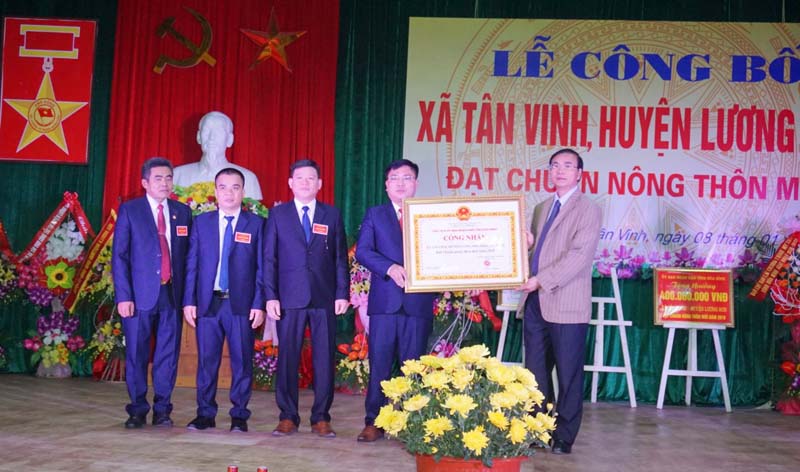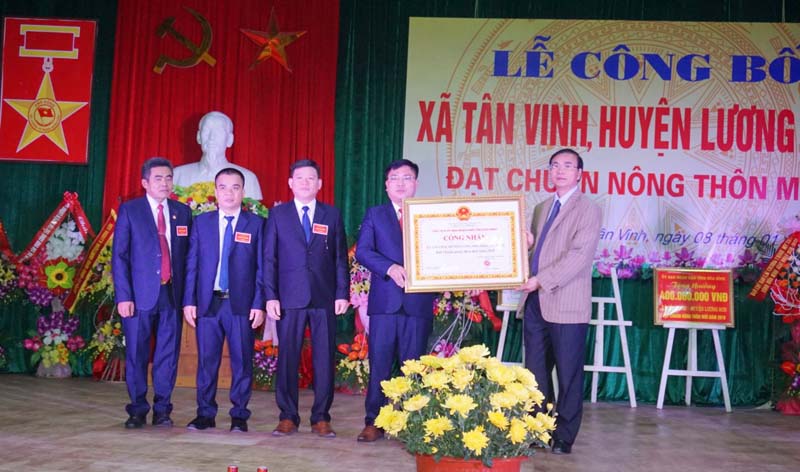
(HBO) – The Luong Son district People’s Committee has held a ceremony marking the recognition of Tan Vinh commune as a new-style rural area. The event was attended by Vice Chairman of Hoa Binh provincial People’s Council Hoang Van Tu.
When it began
new-style countryside building efforts in 2011, Tan Vinh met only four of the
19 criteria. In the eight years through 2018, almost 91 billion VND (3.9
million USD) was raised for the work, including over 11.9 billion VND
contributed by local people.
The recognition came as local infrastructure has
been upgraded, giving a facelift to this rural area. While progress has been
seen in agricultural production along with cultural and social aspects, social
security has been ensured, and political security and social order and safety
kept stable.

Vice
Chairman of the Hoa Binh People’s Council Hoang Van Tu presents the new-style
rural area certificate in 2018 to authorities and people of Tan Vinh commune.
Tan Vinh commune currently houses a flower
farming cooperative group, an agricultural and irrigation cooperative and a
clean food cooperative which altogether have helped provide jobs for and
improve income of local residents.
The average annual per capita income rose from
11 million VND in 2011 to 26.2 million VND in 2017. The household poverty rate
in Tan Vinh was brought down to 5.3 percent in 2017. While more than 75 percent
of the total families have been recognised as civilized families, over 95
percent of the households have gained access to safe water. Local residents
have also actively joined hands to ensure a green, clean and beautiful living
environment.
Recognising the Tan Vinh administration and
people’s efforts, the Hoa Binh provincial People’s Committee certified the
commune as a new-style rural area and rewarded it with a public facility worth
400 million VND.
On this occasion, the Luong Son district
People’s Committee also presented merit certificates to seven collectives and
20 individuals with excellent achievements in new-style rural area building in
Tan Vinh commune./.
According to data from the Hoa Binh Provincial Party Committee, the industrial production index for the first six months of 2025 is estimated to have increased by 20% compared to the same period last year. This marks the highest year-on-year growth rate for this period since 2020.
In the first six months of 2025, Hoa Binh province’s export turnover was estimated at 1.145 billion USD, marking an 18.11% increase compared to the same period in 2024. Import turnover was estimated at $ 804 million, a 17.15% increase, which helped the province maintain a positive trade balance.
The lives of the ethnic minority farmers in Tan Lac district have gradually improved thanks to the new directions in agricultural production. This is a testament to the collective strength fostered through the professional associations and groups implemented by various levels of the district’s Farmers’ Union.
With the motto the "product quality comes first,” after nearly one year of establishment and operation, Muong village’s Clean Food Agricultural and Commercial Cooperative, located in Cau Hamlet, Hung Son Commune (Kim Boi district), has launched reputable, high-quality agricultural products to the market that are well-received by consumers. The products such as Muong village’s pork sausage, salt-cured chicken, and salt-cured pork hocks have gradually carved out a place in the market and they are on the path to obtaining the OCOP certification.
In the past, the phrase "bumper harvest, rock-bottom prices" was a familiar refrain for Vietnamese farmers engaged in fragmented, small-scale agriculture. But today, a new spirit is emerging across rural areas of Hoa Binh province - one of collaboration, organisation, and collective economic models that provide a stable foundation for production.
Maintaining growing area codes and packing facility codes in accordance with regulations is a mandatory requirement for agricultural products to be eligible for export. Recently, the Department of Agriculture and Environment of Hoa Binh province has intensified technical supervision of designated farming areas and packing facilities to safeguard the "green passport" that enables its products to access international markets.



